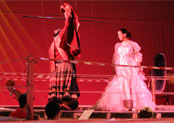OPERA SEARCH

Die arabische Prinzessin, oder Das wiedergeschenkte Leben
(La Princesa árabe/The Arabian Princess) (2008)Texto de Paula Fünfeck basado en un cuento árabe; traducción de Mohamad Abu Zeid; traducción española de Pablo Valdés; traducción francesa de Dominique Caillat y Catherine Fourcassié (Alemán, árabe, español, francés)
S,T,child singer,3speakers; children's chorus;
2(II=picc).2.2.2-2.2.3.0-timp-strings;
on-stage (ad lib. or from orchestra): 1.picc.2.2.2-2.2.1.0-perc:tgl/SD/BD with cym;
alternative instrumentation for 9 players: 0.1.1.1-1.0.0.0-2vln.vla.vlc.db
Abbreviations (PDF)
Bote & Bock
Cultural Palace, Ramallah
François Abou Salem & Paula Fünfeck, director
Conductor: Anna-Sophie Brüning
Company: Youth Orchestra of the Barenboim-Said Foundation / Children's choirs from Ramallah and vicinity
| AMIRAH, una princesa | Soprano |
| JAMIL, un vendedor de pescado | Tenor |
| SAFAH, doncella preferida de Amirahs | Soprano |
| Abuela | Papel hablado (Puede ser la misma persona del papel de Safah) |
| El extranjero/Príncipe olvidadizo de mil colores | Papel hablado |
| El niño | Papel hablado |
| Partyratón y Partyleón | Solistas del grupo de pantomima con partes habladas |
| Ballet marino: Peces / Monstruos marinos / Gaviotas | Grupo de pantomima (Niños pequeños) |
| Corte del príncipe | Grupo de pantomima |
| Sirvientes / Pescadores / Vendedores de pescado / Niños callejeros / Invitados de boda, corte | Coro |
El hijo de un pobre pescador no quiere estudiar, todos los maestros están desesperados con él. No obstante es un muchacho tan guapo y tiene una voz tan dulce que, aunque de procedencia tan humilde, consigue conquistar el corazón de la princesa. Cuando vocea su mercancia, su voz resuena mil veces mejor que los espléndidos sollozos del cantor de la corte.Y cuando uno escucha quiere ver de donde procede lo que escucha. La princesa ve al pescador y, a partir de ese momento, sólo puede sentir amor por él. Decide, que cueste lo que cueste, tiene que convertirle en principe y casarse con él. Sin embargo, no todo es tan fácil como parece y, a partir de entonces les esperan grandes aventuras, un proceso de aprendizaje, que no será siempre un camino de rosas para los amantes que al final se unirán para siempre.
For the Barenboim-Said Foundation's first opera project we decided to commission a libretto, but not a new composition'with only a year to prepare, time would have been too short. We therefore took recourse to already existing music by the Spanish composer J. C. de Arriaga (1806–1826) and put together an opera pasticcio from several of his works. To this we added traditional Arabic music, played by musicians from the region. The music of Arriaga, who died at the age of nineteen and is often referred to as the 'Spanish Mozart,' is held in high regard particularly by string players, owing to his superb string quartets. Less known is his symphony, and completely unknown are his vocal scenes, chorale pieces, and small occasional compositions that until recently existed only in the original manuscripts and which we arranged for this opera with the generous support of the Fundación Vizcaina Aguirre. Arriaga's music is eminently suitable for this project. It is—like Mozart's—directly accessible and easily comprehensible for young people and adults alike, yet at the same time of the highest quality. Moreover, Arriaga lends our piece the so very important Spanish element. Even though the music comes from a later epoch, it symbolizes the land in which until the end of the fifteenth century the three monotheistic civilizations coexisted peacefully and in dialogue with one another. A dialogue that is largely missing today more than ever before.
Anna-Sophie Brüning
(The work was first performed under the title Die Sultana von Cádiz / The Sultana of Cadiz.)
Poetic
